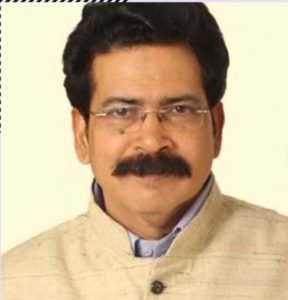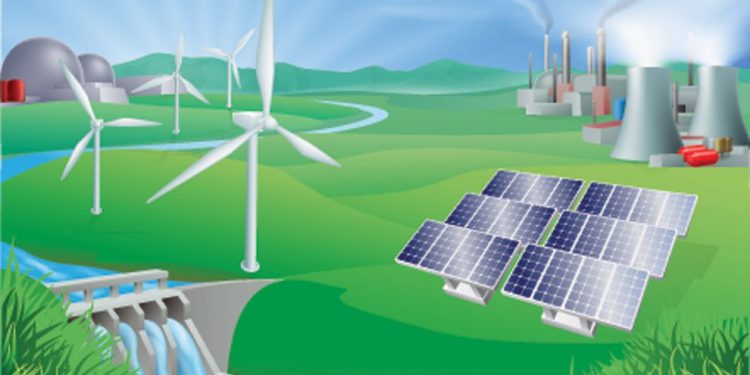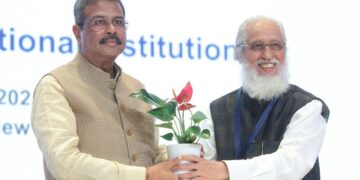By Dr. AP Dash *
 Power and Energy sector is one of the strategic sectors in national building and sustaining our society. The changing world has changed this sector as well. Only a university dedicated to Power and Energy, can equip us to sync with the changes and remain part of the emerging technologies and job roles. A Bharat Power & Energy University, whose acronym BAPU goes with father of nation, Mahatma Gandhi popularly Bapu, can fulfil this national need as well as become a way of remembering him as he stood for education and eradication of illiteracy throughout his life.
Power and Energy sector is one of the strategic sectors in national building and sustaining our society. The changing world has changed this sector as well. Only a university dedicated to Power and Energy, can equip us to sync with the changes and remain part of the emerging technologies and job roles. A Bharat Power & Energy University, whose acronym BAPU goes with father of nation, Mahatma Gandhi popularly Bapu, can fulfil this national need as well as become a way of remembering him as he stood for education and eradication of illiteracy throughout his life.
It fits into the mantra of ‘Tomaso Ma Jotirgamay” very much in the literary sense. Government of India has released its roadmap to achieve 175 GW capacity in renewable energy by 2022, which include 100 GW of solar power and 60 GW of wind power. In 2015, as per IEA report, renewables – solar, wind and hydro – have added up 153 GW of generation capacity globally, which is more than conventional fossil fuel thermal generation. This year IEA estimates that the total renewable capacity increases more than 60% to 4000 GW by 2024, by which time it is twice the size of today’s global coal capacity.
In a conservative estimate, the need for technical manpower and non-technical manpower would be 1367000 and 428000 numbers in the 13th plan. The way solar sector is growing, the need for technical skilled manpower (at apprentice and operator level) is considered to be very high, though, no clear estimate is available now. The latest CEA report corroborates this assertion. With many employees retiring, the need for filling up the positions would be very urgent. Somebody levelled it as a ”Decade of retirement”. This happened to many companies in India. If we do not prepare for the eventuality now, the country would face a severe crunch of adequately trained manpower in the near future.
Next to poverty, it is perceived that energy is the biggest challenge for our country. We are an energy starved nation. We are still dependant on oil rich Countries to fulfil our energy needs. Major part of our import bill is still import of oil and gas, leading to a negative balance of payment situation. Our energy sector is going through a revolution. At this critical juncture, the recent national Education policy (NEP) is a pioneering effort in the direction of liberating education and making it more flexible. Imagining a Corporate University in Energy sector, in consonance with NEP, looks very logical, Bharat Power and Energy University (BAPU) perhaps?
BAPU would create certified, industry-ready power and energy professionals, who are ready to take on a job immediately. It would run courses of prime importance in power and energy sector. Courses would be short term and long term. It is perceived that University is for the masses. Hence, apart from regular and in-campus courses, the USP of the University would be to launch courses on correspondence to reach out to the common man. Executive education would be an integral part of the University, where knowledge transfer will take place.
Education and research go hand in hand. As stated earlier, this University will engage in action research and disseminate knowledge. It would undertake futuristic studies and help frame policy guidelines. It would fill the knowledge gap between academics and industry through active industry-academic interface. In order to make research more industry specific, the University can float Chairs and get endowment fund from Corporate to create a corpus to sustain the Chair.
A Centre of excellence (COE) on Renewable would not only be very contemporary and very impactful. Constitution of COE would not only put more emphasis on this sunrise sector but would contribute substantially for the growth at national and international level.
It is presumed that BAPU would engage in global collaboration and global funding. By being a part of the global alliances, the University would not only have global recognition but can collaborate to synergise on critical areas and priorities. For example, it can collaborate with EPRI, USA, to do cutting-edge research and may work on Shale gas technology. It can collaborate with the geo thermal initiatives of New Zealand Universities. It can do collaborative research with Universities in Canada, Brazil and Argentina in Hydro sector. Singapore is good case study for power distribution and Nanyang Technical University (NTU) has a Centre of excellence in Energy, which gets international funding and is worth collaborating. These are indicative examples. For research, sky is the limit. It all depends on how much we fly.
Universities are for universal education. They are citadel of inclusive education. We can imagine a scenario, where a technician, a plumber, a wielder or any technical hand needed for power and energy sector, would like to get certified to get a job. Let us visualise again a scenario where, in a family, the father is skilled but aged and he wants his son/daughter to grow in his field. But he does not have money to send for a formal education. This is where BAPU would contribute a lot by floating mass certified correspondence courses and ask the students to take the “hands on” part through workshops in certified ITIs in the vicinity.
There are many, at least 50, small and big, Institutes in the Country who are engaged in teaching and research in the power and energy sector. They can be affiliated to BAPU and become Centre of excellence. Being under one umbrella, all these Institutes can synergise their operation. Now, we do not know who is doing what.
Corporate CSR and BAPU
 Father of the nation was passionate about corporate houses being an engine of change in ploughing back funds for social development. Now that every profitable enterprise is mandated to spend 2% of the profit on CSR, his dream can be realised. Corporate may find it very easy and truly emancipating to allocate fund from CSR spending on BAPU, as it would carter to a very core sector of the economy.
Father of the nation was passionate about corporate houses being an engine of change in ploughing back funds for social development. Now that every profitable enterprise is mandated to spend 2% of the profit on CSR, his dream can be realised. Corporate may find it very easy and truly emancipating to allocate fund from CSR spending on BAPU, as it would carter to a very core sector of the economy.
The best gift we can ever think of giving to Bapu on his birthday is BAPU. The benefit of BAPU to the Indian economy in general and power and energy sector in particular, would certainly be huge and may actually contribute to our Government’s vision and recent strategy of “Power for all”.
* Dr. AP Dash, Dean, NTPC School of Business (NSB), Noida. Views are personal.











